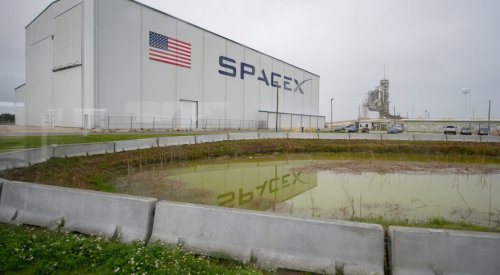Firefighters extinguished a minor fire Sunday on the roof of a building SpaceX is leasing at Port Canaveral.
The fire caused some damage to the roof of the building SpaceX started leasing earlier this year for storage of rocket boosters after landing.
SpaceX said in a statement Sunday evening that no SpaceX hardware was damaged, and the cause of the fire is under investigation. [WESH-TV Orlando]
More News
Language creating a Space Corps made it through the House version of a defense authorization bill, but its future is unclear. The House voted 344–81 Friday to approve the National Defense Authorization Act (NDAA), which includes language requiring the Air Force to create a Space Corps to handle space duties. Support for the Space Corps, though, is not as strong in the Senate, whose version of the NDAA lacks the Space Corps provision. The Senate bill instead creates the new position of Chief Information Warfare Officer whose responsibilities would include space and launch systems. That would likely mean the Space Corps future will depend on the outcome of the conference that will work out differences between the House and Senate bills. [SpaceNews]
An incident during launch preparations could postpone next month’s launch of a NASA communications satellite. The agency said Saturday that NASA and spacecraft manufacturer Boeing are investigating an incident Friday involving the TDRS-M spacecraft as it was undergoing final closeout activities prior to being integrated to its Atlas 5 rocket. NASA provided no other details other than to say it involved the omnidirectional S-band antenna on the spacecraft. TDRS-M, the last in the third generation of TDRS communications satellites, is currently scheduled for an Aug. 3 launch from Cape Canaveral. [NASA]
As the reestablished National Space Council takes shape, those in the space community are lining up to support it. The White House’s selection late Thursday of Scott Pace to serve as executive secretary won widespread support from various organizations in the industry. At a symposium Friday, a panel of former White House officials who worked on space policy also endorsed the creation of the space council, believing that it will give space issues greater prominence within the administration while also providing additional staff to address them. [SpaceNews]
A Singapore-based company developing orbital debris removal technologies has raised $25 million.Astroscale raised the Series C round from a mix of venture capital firms and companies, bringing the total the company has raised to date to $53 million. Astroscale is developing one spacecraft, Idea OSG-1, scheduled for launch next year to monitor submillimeter-sized space debris, and another, ELSA-d, for launch in 2019 to test debris removal technologies. [SpaceNews]
A Soyuz rocket launched Friday completed the deployment of its payload of 73 satellites. The rocket wrapped up the deployment of the satellites more than eight hours after launch, distributing them into three different orbits. The payload included satellites for Astro Digital, GeoOptics, Planet and Spire, as well as for other organizations in Russia and several other countries. The launch set a record for the most satellites launched on a single Soyuz rocket. [SpaceNews]
An Air Force general said software used in space systems is another area in need of reform. Gen. Ellen Pawlikowski, the leader of Air Force Material Command, said Friday that requirements to support antiquated systems bogs down acquisition and development of space systems. She also noted that a “zero risk tolerance culture” for space systems results in review processes that slow down development of space systems overall. [SpaceNews]
India’s space agency is looking for additional suppliers to speed up the production of launch vehicles.ISRO is seeking multiple vendors of most components of its PSLV and GSLV rockets, ranging from fuel tanks and structures to payload fairings. ISRO has goals of producing 12 launch vehicles a year, and also handing over production of rockets to an industry consortium by 2020. [The Hindu]
Jeff Bezos accepted an award Saturday named after, and presented by, Buzz Aldrin. Bezos received the first Buzz Aldrin Space Innovation Award at Aldrin’s ShareSpace Gala at the Kennedy Space Center Visitor Complex for the work by Blue Origin on its New Shepard suborbital vehicle and future New Glenn orbital launch vehicle. Former astronaut Mae Jemison also received the first Buzz Aldrin Space Pioneer Award at the event. [GeekWire]
Engineers are still working to fix a malfunctioning drill on the Curiosity Mars rover. The drill has been out of service since last December after controllers noticed a problem with its drill feed mechanism. Engineers haven’t given up trying to fix the problem, but are also looking at alternative ways to use the drill to work around the problem. [Space.com]
The early solar system may have been filled with mudballs. New modeling of conditions in the early solar system suggests that, when the first asteroids formed, heating from radioactive decay melted ice within them, initially suspending the dust grains inside them rather than forming rocks. The model explains why meteorites linked to those early asteroids have the same chemistry as the sun, and could also explain differences between comets and asteroids. [Science News]
- Space Corps proposal becoming flashpoint in DoD budget negotiations
- The Moon is the gateway to NASA’s exploration future
- Cruz interested in updating Outer Space Treaty to support commercial space activities
- For Rep. Rogers, fighting through a war in space starts with fixing acquisition
- Trump’s Air Force pick says increasing space-threat awareness a priority
Share with your friends

(0) Comments
This article comments are currently no :(